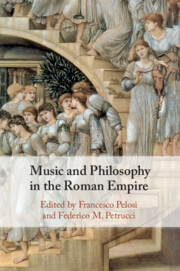Book contents
- Music and Philosophy in the Roman Empire
- Music and Philosophy in the Roman Empire
- Copyright page
- Contents
- Notes on Contributors
- Acknowledgements
- Abbreviations
- Introduction
- Chapter 1 The Scala Naturae and Music
- Chapter 2 Music and Plutarch’s Platonic Cosmos
- Chapter 3 The Harmoniser God
- Chapter 4 Alexander of Aphrodisias and Musical Models for Ontological Enquiries
- Chapter 5 How to Resist Musical Dogmatism
- Chapter 6 Shifting Epistemological Perspectives in Ptolemy’s Harmonics
- Chapter 7 Musical Imagery in Clement of Alexandria and Origen
- Chapter 8 Plotinus on Music, Rhythm, and Harmony
- Chapter 9 Porphyry’s Commentary on Ptolemy’s Harmonics
- Chapter 10 The Music of the Virtues in Late Ancient Platonism
- Chapter 11 Harmonics as Theological Paradigm in Proclus
- Chapter 12 Calcidius on Cosmic Harmony
- Chapter 13 Harmonia in Philoponus’ Commentary on Nicomachus’ Introduction to Arithmetic
- Bibliography
- Index Locorum
- General Index
Chapter 7 - Musical Imagery in Clement of Alexandria and Origen
The Greek Musical World Revised and Accepted
Published online by Cambridge University Press: 27 November 2020
- Music and Philosophy in the Roman Empire
- Music and Philosophy in the Roman Empire
- Copyright page
- Contents
- Notes on Contributors
- Acknowledgements
- Abbreviations
- Introduction
- Chapter 1 The Scala Naturae and Music
- Chapter 2 Music and Plutarch’s Platonic Cosmos
- Chapter 3 The Harmoniser God
- Chapter 4 Alexander of Aphrodisias and Musical Models for Ontological Enquiries
- Chapter 5 How to Resist Musical Dogmatism
- Chapter 6 Shifting Epistemological Perspectives in Ptolemy’s Harmonics
- Chapter 7 Musical Imagery in Clement of Alexandria and Origen
- Chapter 8 Plotinus on Music, Rhythm, and Harmony
- Chapter 9 Porphyry’s Commentary on Ptolemy’s Harmonics
- Chapter 10 The Music of the Virtues in Late Ancient Platonism
- Chapter 11 Harmonics as Theological Paradigm in Proclus
- Chapter 12 Calcidius on Cosmic Harmony
- Chapter 13 Harmonia in Philoponus’ Commentary on Nicomachus’ Introduction to Arithmetic
- Bibliography
- Index Locorum
- General Index
Summary
In the Christian literature of the first centuries, notions such as those of harmonia, symphōnia and epōidē – just to mention a few – as well as many musical instruments and musical myths borrowed from pagan culture, appear, in an adequately reinterpreted form, in the description and explanation of fundamental aspects of Christian doctrine. The chapter examines some musical concepts and images in Clement of Alexandria’s and Origen’s works, with a specific focus on the Greek musical culture that lies in the background of this rich musical imagery. By analysing Clement’s and Origen’s strategy of reinterpretation and appropriation of fundamental figures and notions drawn from the Greek musical world – such as the figure of Orpheus and the notion of symphōnia – the chapter shows that the use of music stands out as a momentous feature in the apologetic and exegetical activities of these Christian writers, touching upon some crucial issues, such as the Christian attitude to pagan culture and the relationship between Christianity and philosophy.
- Type
- Chapter
- Information
- Music and Philosophy in the Roman Empire , pp. 153 - 177Publisher: Cambridge University PressPrint publication year: 2020

